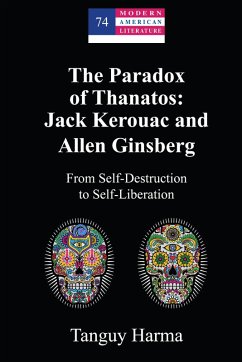More often associated with hedonism and cheap thrills than with notions of alienation and suffering, Beat literature has rarely been envisaged from the perspective of the paradoxical dynamics at play in the writings. What this book evidences is that the sacrosanct quest for transcendence staged by Kerouac and by Ginsberg is underpinned, primarily, by a trope of nullification that acts as a menace for the self. This tropism for destruction and death is not only emblematic of their works, it is also used as a literary strategy that seeks to conquer the fear of self-annihilation through the writing itself. It is precisely this interplay-approached through an Existentialism that simultaneously converges upon the Transcendentalist legacy of Beat writing-which probes the paradoxical dimension of the texts, enabling the mythological figure of Thanatos to take centre stage.
The critical synergy of the book, brought about by relating American literature and culture to European thought, enables in-depth analyses of a selection of novels and poems, grasped through their aesthetic, ontological and historical dimensions. Shedding new light on the literary strategies of two widely misunderstood American writers of the twentieth century, this captivating study into the drives for self-destruction and self-liberation encapsulated by Kerouac and Ginsberg sets out to reinvent the well-worn definition of 'Beat' through its original approach-an essential critical piece for all those interested in the American counterculture.
The critical synergy of the book, brought about by relating American literature and culture to European thought, enables in-depth analyses of a selection of novels and poems, grasped through their aesthetic, ontological and historical dimensions. Shedding new light on the literary strategies of two widely misunderstood American writers of the twentieth century, this captivating study into the drives for self-destruction and self-liberation encapsulated by Kerouac and Ginsberg sets out to reinvent the well-worn definition of 'Beat' through its original approach-an essential critical piece for all those interested in the American counterculture.
Dieser Download kann aus rechtlichen Gründen nur mit Rechnungsadresse in A, D ausgeliefert werden.
"The Paradox of Thanatos takes a fresh look at the Beat Generation and its ambiguous aesthetic tenets. Shuttling back and forth between self-destruction and self-liberation, Kerouac and Ginsberg, who are at the center of this new study of 1950s American counterculture, have often been (mis-)understood as prophets of drugs, sex, and the doom of individual creativity. As Harma convincingly argues, however, while revelling in the destruction of the creative self by the stifling forces of mass-consumption and greed, the Beats also managed to forge a more positive vision, and thus carve out a spiritual space that allowed for transcendence and (aesthetic) redemption. Harma's is a timely study that adds an important new angle on postwar American society and its countercultural critics." -Klaus Benesch, Full Professor of English and American Studies; LMU, International Research Professor; LMU, The University of Munich


